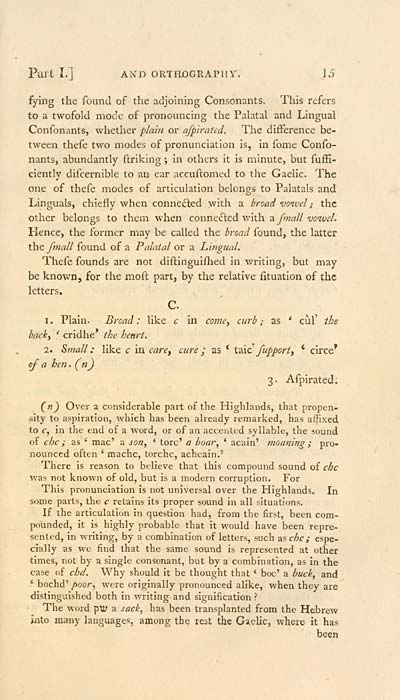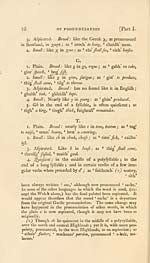Download files
Complete book:
Individual page:
Thumbnail gallery: Grid view | List view

Part I.] AND ORXnOGRAPHY. Ì5
£ying the found of the adjoining Consonants. This refers
to a twofold niode of pronouncing the Palatal and Lingual
Confonants, whether p/ain or a/pirated. The difference be-
tween thefe two modes of pronunciation is, in fome Confo-
nants, abundantly flriking ; in others it is minute, but fuffi-
ciently difcernible to an ear accuftomed to the Gaelic. The
one of thefe modes of articulation belongs to Palatals and
Linguals, chiefly when connected with a broad voivel ; the
other belongs to them when conne6led with a yJwrt// wzw/.
Hence, the former may be called the broad found, the latter
the /mall found of a Palatal or a Lingual.
Thefe founds are not diftinguifhed in writing, but may
be known, for the moft part, by the relative fituation of the
letters.
C.
1. Plain. Broad: like c in come, curb; as * cul' the
bachy ' cridhe* the heart.
2. Small : like c in care^ cure ; as * i2Ìc fupporty * circe*
ef a hen . (n)
3. Afpirated.
(^n) Over a considerable part of the Highlands, that propen-
sity to aspiration, which has been already remarked, has affixed
to r, in the end of a word, or of an accented syllable, the sound
of chc ; as ' mac' a son, ' tore' a boar, ' acain' moaning ; pro-
nounced often ' machc, torchc, achcain.'
There is reason to believe that this compound sound of chc
was not known of old, but is a modern corruption. For
This pronunciation is not universal over the Highlands. In
some parts, the c retains its proper sound in all situations.
If the articulation in question had, from the first, been com-
pounded, it is highly probable that it would have been repre-
sented, in writing, by a combination of letters, such as chc; espe-
cially as we find that the same sound is represented at other
times, not by a single consonant, but by a combination, as in the
case of chd. Why should it be thought that ' hoc' a buck, and
' bochd' fioor^ were originally pronounced alike, when they are
distinguished both in writing and signification ?
The word pU> a sack, has been transplanted from the Hebrew
into many languages, among the rest the Gaelic, where it has
been
£ying the found of the adjoining Consonants. This refers
to a twofold niode of pronouncing the Palatal and Lingual
Confonants, whether p/ain or a/pirated. The difference be-
tween thefe two modes of pronunciation is, in fome Confo-
nants, abundantly flriking ; in others it is minute, but fuffi-
ciently difcernible to an ear accuftomed to the Gaelic. The
one of thefe modes of articulation belongs to Palatals and
Linguals, chiefly when connected with a broad voivel ; the
other belongs to them when conne6led with a yJwrt// wzw/.
Hence, the former may be called the broad found, the latter
the /mall found of a Palatal or a Lingual.
Thefe founds are not diftinguifhed in writing, but may
be known, for the moft part, by the relative fituation of the
letters.
C.
1. Plain. Broad: like c in come, curb; as * cul' the
bachy ' cridhe* the heart.
2. Small : like c in care^ cure ; as * i2Ìc fupporty * circe*
ef a hen . (n)
3. Afpirated.
(^n) Over a considerable part of the Highlands, that propen-
sity to aspiration, which has been already remarked, has affixed
to r, in the end of a word, or of an accented syllable, the sound
of chc ; as ' mac' a son, ' tore' a boar, ' acain' moaning ; pro-
nounced often ' machc, torchc, achcain.'
There is reason to believe that this compound sound of chc
was not known of old, but is a modern corruption. For
This pronunciation is not universal over the Highlands. In
some parts, the c retains its proper sound in all situations.
If the articulation in question had, from the first, been com-
pounded, it is highly probable that it would have been repre-
sented, in writing, by a combination of letters, such as chc; espe-
cially as we find that the same sound is represented at other
times, not by a single consonant, but by a combination, as in the
case of chd. Why should it be thought that ' hoc' a buck, and
' bochd' fioor^ were originally pronounced alike, when they are
distinguished both in writing and signification ?
The word pU> a sack, has been transplanted from the Hebrew
into many languages, among the rest the Gaelic, where it has
been
Set display mode to: Large image | Transcription
Images and transcriptions on this page, including medium image downloads, may be used under the Creative Commons Attribution 4.0 International Licence unless otherwise stated. ![]()
| Early Gaelic Book Collections > Blair Collection > Elements of Gaelic grammar > (45) |
|---|
| Permanent URL | https://digital.nls.uk/79040515 |
|---|
| Description | A selection of books from a collection of more than 500 titles, mostly on religious and literary topics. Also includes some material dealing with other Celtic languages and societies. Collection created towards the end of the 19th century by Lady Evelyn Stewart Murray. |
|---|
| Description | Selected items from five 'Special and Named Printed Collections'. Includes books in Gaelic and other Celtic languages, works about the Gaels, their languages, literature, culture and history. |
|---|

